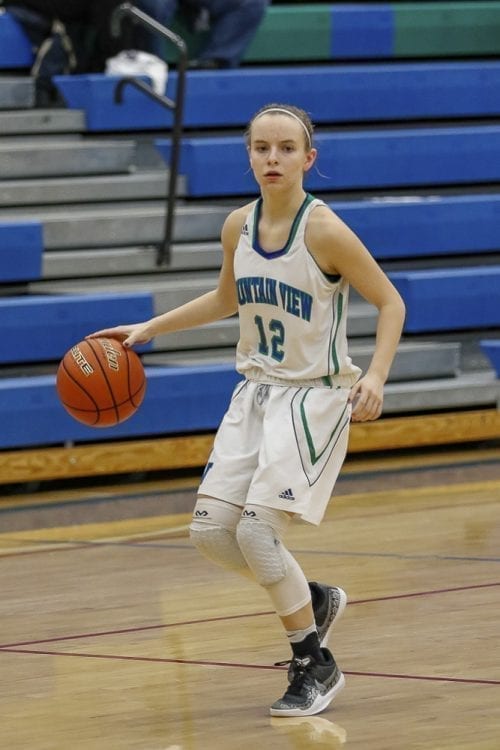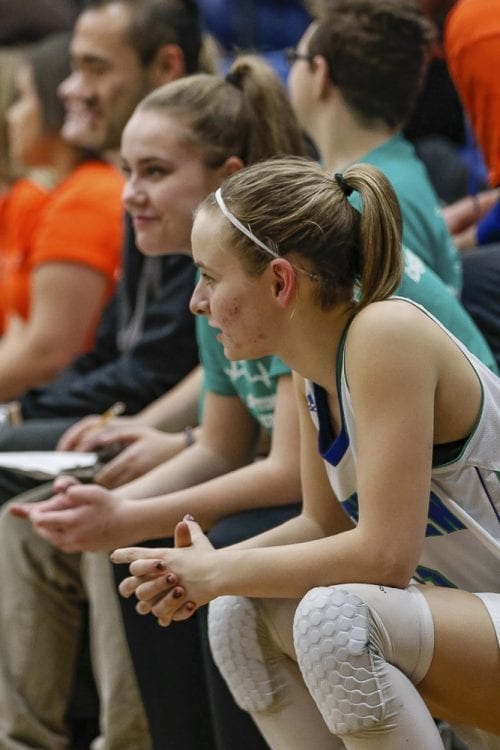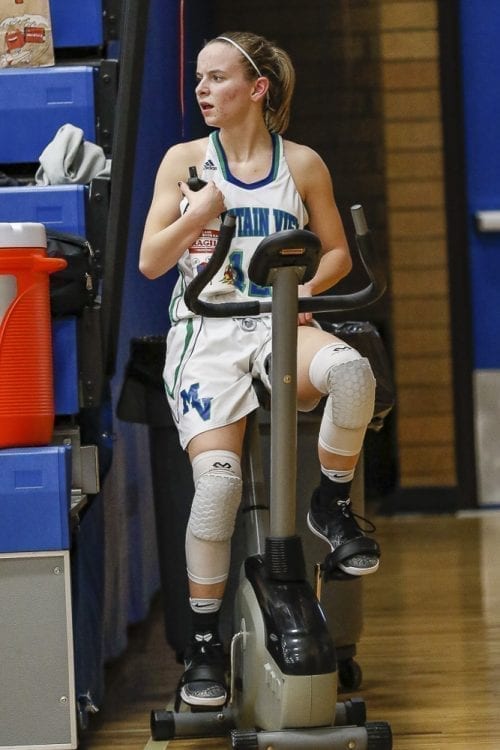Faith McIntosh and Arielle Pinzone share the disease as well as a love for basketball
VANCOUVER — Faith McIntosh has had to deal with it her entire life, diagnosed before her second birthday.
Arielle Pinzone just found out months ago.
McIntosh had a couple of years of hope, thinking the disease had gone into remission, only to have it return.
Pinzone spent years going to doctors, trying to figure out why she was in constant pain.

Now, the two sophomores at Mountain View High School are linked. They share a love for sports, for the Thunder girls basketball team, and they share the same condition.
McIntosh is resigned to the fact that she likely will never play organized basketball again. Pinzone said she will play as long as she can.
Juvenile rheumatoid arthritis has a different effect on each person it afflicts.
McIntosh, the daughter of Mountain View coach Dave McIntosh, is a team manager for the Thunder.
“I still want to be involved in basketball,” she said. “It’s the closest thing I can get to playing without actually playing.”
Pinzone is a starting guard on the team, but with limited minutes based on her pain threshold.
“I’d hate to give up sports. I’m an athletic person. It’s just something I deal with because I love sports so much,” Pinzone said. “There are times I think of quitting, but I can’t.”
Growing up with it, McIntosh has a deeper understanding of the disease. Pinzone is still learning.
“Kids can get arthritis? What?” Pinzone recalled thinking when she got the news.
“That’s what everyone says,” McIntosh said.
McIntosh also offered a sobering piece of information.
“The odds of it going away are slimmer the older you get,” McIntosh said.
“I did not know that,” Pinzone said.
“Sorry,” McIntosh replied.
As classmates, as teammates, they will be able to rely on each other.

An early diagnosis
McIntosh kept limping as she learned to walk. The abnormality sent the family to the doctor. It took time and specialists, but Faith got her diagnosis. Not that she knew what it was at that age. She does recall the day she understood.
“I remember a long time ago, I was 4 or 5, sitting on my bed in the morning so stiff I couldn’t walk,” McIntosh said. “My mom had to explain it to me. She got all teary-eyed trying to explain that her daughter is disabled.”
The symptoms — stiffness, swelling of joints, pain — intensified throughout elementary school. But in middle school, her condition improved. She even played basketball.
“They thought it had gone away,” McIntosh recalled. “I was pretty lucky throughout middle school. But it came back the summer after eighth grade. It’s just got worse as high school has gone on.”

A later diagnosis
Pinzone, who was a soccer player before she turned to basketball, had been seeing doctors regularly since she was about 10 years old, dealing with constant knee and ankle pain. Then back pain, too.
“We didn’t know what it was,” she said.
She stopped soccer and focused on basketball because it was easier to manage the pain on the court.
“Kicking hurt a lot,” she said.
Still, it was frustrating to deal with all the pain without explanation. Others had questioned her toughness or her sincerity. Always hurt, she heard some people wondering if she was faking it, for attention.
“I couldn’t explain to them because they didn’t understand,” Pinzone said. “It was degrading. It pushed me to go harder, too, but that wasn’t good for my body.”
Six months ago, she received the diagnosis. While there remains a lot of uncertainty, at least she had an answer for all that she had endured in the past. Now there could be a plan for the future.
That included some guidelines for her playing time. For the most part, it’s three minutes on, then three minutes off the court. There are times Pinzone’s time on the floor is extended.
Her coach usually knows the right moment to make a substitution. He has plenty of experience dealing with Juvenile rheumatoid arthritis, after all. But when Dave McIntosh might miss a signal, Faith McIntosh is all over it, and she will remind her dad that Pinzone could use a break.
They make for quite the team within the team.
Teammates with a special bond
Faith McIntosh’s condition will not allow for her to compete at such a level as varsity basketball.
“I still wish I could play, but it’s a winter sport. The symptoms are so much worse in the winter,” she said. “Some days, I can’t walk down the stairs without a bunch of pain. No way I could run across the court. At the end of the day, I can’t move my knees.”
On the good days, though, she still shoots around with the team at practice, gets a feel for that love of basketball. And by being a team manager, she is all-in with the Thunder.
“I do get quite a bit sad that I’m not out there playing,” McIntosh said. “At the same time, I like to be able to watch them and almost coach them a little bit.”
She said she loves how inclusive the team is to her.
Pinzone loves that her teammates do not make excuses for her, and they keep her accountable, but they also show plenty of compassion.
“For me, it’s hard knowing my time is limited, so I work hard on the court for the time I do have,” Pinzone said.
Still, having this condition, for lack of a better word, sucks, Pinzone says.
“It holds us back. Not even just in sports,” she said. “In the winter time, when I have to get ready for school, it’s just dreadful getting up.”
Yet, here they are, getting up every day, still going to class, still participating in basketball, in any way they can.
“This is just how it is,” McIntosh said, no bitterness whatsoever detected in her voice.
McIntosh has had her whole life to come to terms with that break. Pinzone is just now figuring out how to deal with it.
It helps that they are in this together, teammates with a special bond.




